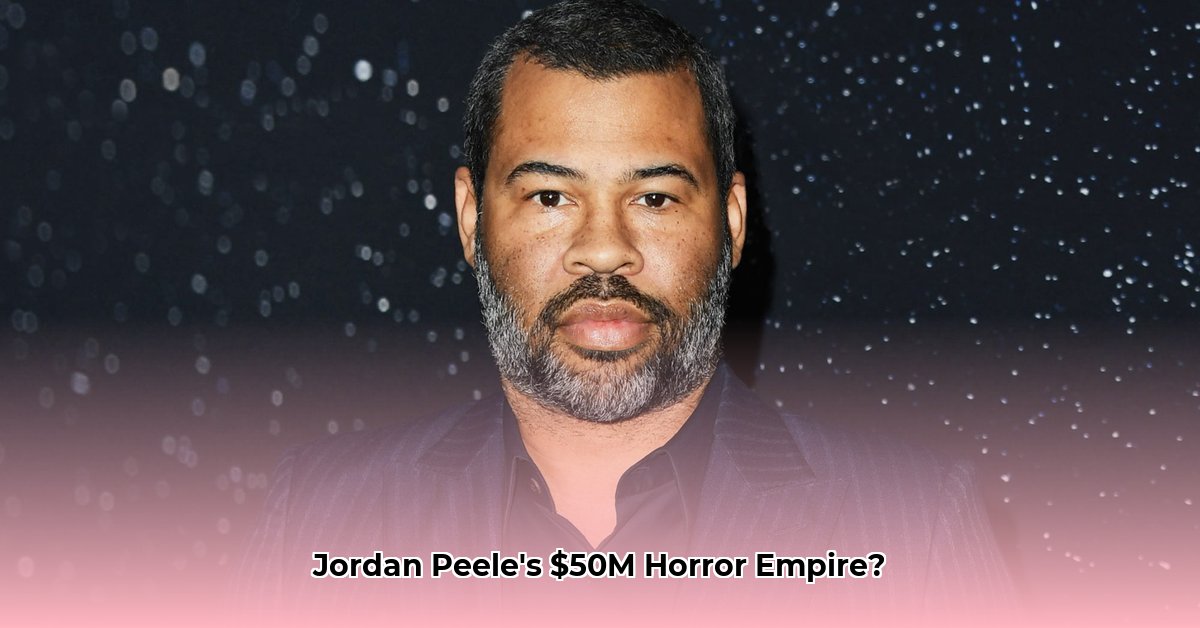
Jordan Peele Net Worth: A Look at the Horror Mogul's Massive Success
Jordan Peele. The name evokes chilling suspense, sharp social commentary, and a considerable fortune. But how did this comedic genius become a horror heavyweight with an estimated net worth of $50 million by 2025? This exploration delves into the fascinating financial trajectory of Peele's remarkable success.
From Funnyman to Fright Master: Laying the Groundwork
Peele's journey wasn't a sudden leap but a carefully constructed ascent, beginning with Key & Peele. This sketch comedy show wasn't merely about laughs; it built brand recognition, honed his comedic timing, and provided a platform to showcase his storytelling prowess. This foundational experience proved invaluable, building industry connections and refining his unique creative voice—a voice that would later resonate powerfully within the horror genre.
Get Out: The Phenomenon That Changed Everything
Then came Get Out, a cultural phenomenon, not just another horror film. Critics lauded it (scoring a near-perfect 99% on Rotten Tomatoes!), audiences flocked to theaters, and the box office exploded with over $255 million in revenue. This wasn't merely a financial windfall; it was a career-defining moment. Get Out solidified Peele's status as a visionary director and writer, seamlessly blending masterful storytelling with potent social commentary. This success wasn't a fluke; it showcased his talent, audience understanding, and ability to craft films that were both terrifying and deeply thought-provoking.
Monkeypaw Productions: More Than Just a Name
Peele's financial acumen extends beyond his onscreen accomplishments. He wisely founded Monkeypaw Productions, a strategic business decision generating diverse income streams. Monkeypaw allows him to produce and develop projects, generating revenue from various sources, mitigating risk, and securing a more stable financial future. This isn't merely a production company; it's a strategic engine driving Peele's financial growth, enabling control over his projects from inception to distribution.
Breaking Down the Millions: Peele's Revenue Streams
Peele's substantial net worth is built upon a foundation of diverse income streams:
Directing Fees: Substantial paychecks from directing Get Out, Us, and Nope. These aren't simply director's fees; they reflect his undeniable talent and the resounding success of his films.
Producing Fees: Monkeypaw Productions generates significant income through producing credits. This demonstrates Peele's business acumen, enabling profit from successful projects even when he's not the director.
Screenwriting: Peele's writing skill is a core component of his success, earning him additional income while maintaining creative control.
Streaming Rights and Merchandising: Revenue extends beyond box office success, encompassing streaming deals and merchandise sales, ensuring consistent income and financial stability.
The Future is Uncertain, But Peele's Trajectory Remains Impressive
While his current financial standing is impressive, the entertainment industry is unpredictable. Potential risks include the possibility of future projects underperforming, changing audience tastes, and increased competition. However, Peele's methodical approach and remarkable talent suggest sustained success. His reputation, established fanbase, and proven ability to create compelling stories are powerful assets. However, continuous innovation and shrewd decision-making will remain crucial for maintaining his financial trajectory.
More Than Just Money: Peele's Lasting Impact
Peele's story transcends mere financial figures. He’s revitalized the horror genre, injected social commentary into mainstream filmmaking, and opened doors for diverse voices in Hollywood. His legacy extends far beyond his net worth, securing his place in cinematic history. His success reflects his talents, insightful storytelling, and ability to connect profoundly with audiences. Ultimately, Peele’s story shows that Hollywood success often depends as much on business acumen as on creative genius.
How Jordan Peele Structured His Universal Deal for Maximum Profitability
Key Takeaways:
- Peele's Universal deal wasn't just a paycheck; it was a strategic partnership for long-term growth.
- His success hinges on creative control and a proven track record of box office successes.
- Diversification, through Monkeypaw Productions, minimized risk and maximized revenue streams.
- The deal rewarded milestones and creative output, aligning incentives.
- Peele's unique brand, blending social commentary with mainstream appeal, added immense value.
From Comedy King to Horror Mogul: Building the Brand
Peele's journey from Key & Peele to a lucrative Universal deal showcases masterful brand building. His early success established him not just as a comedian, but as a shrewd businessman. His foray into horror wasn't a gamble but a calculated move. Get Out's massive success cemented his status as a unique Hollywood force. This wasn't merely talent; it was a carefully crafted brand.
Analyzing the Success: More Than Just Horror
Peele's ability to blend commercial success with artistic merit is exceptional. His films are both critically acclaimed and financially lucrative—a rare feat in Hollywood. This "high-brow meets mainstream" approach is key to his success. His movies resonate with a diverse audience, appealing to horror fans and those seeking deeper social commentary.
Financial Success: A Calculated Risk
Peele's Universal deal likely involved upfront payments, profit participation, and backend deals. This approach spread risk, ensuring both short-term gains and long-term financial stability. While specific details remain confidential, the deal's scale underscores the significant financial return on Peele's established brand and box office history.
Looking Ahead: The Future of Peele's Empire
Future projects will further shape Peele's financial trajectory. However, his established brand and ability to create financially successful and critically acclaimed films guarantee he remains a valuable asset. His model demonstrates a shift in Hollywood—prioritizing brand value over traditional production metrics. This revolutionary approach is likely to influence how studios approach talent for years to come.